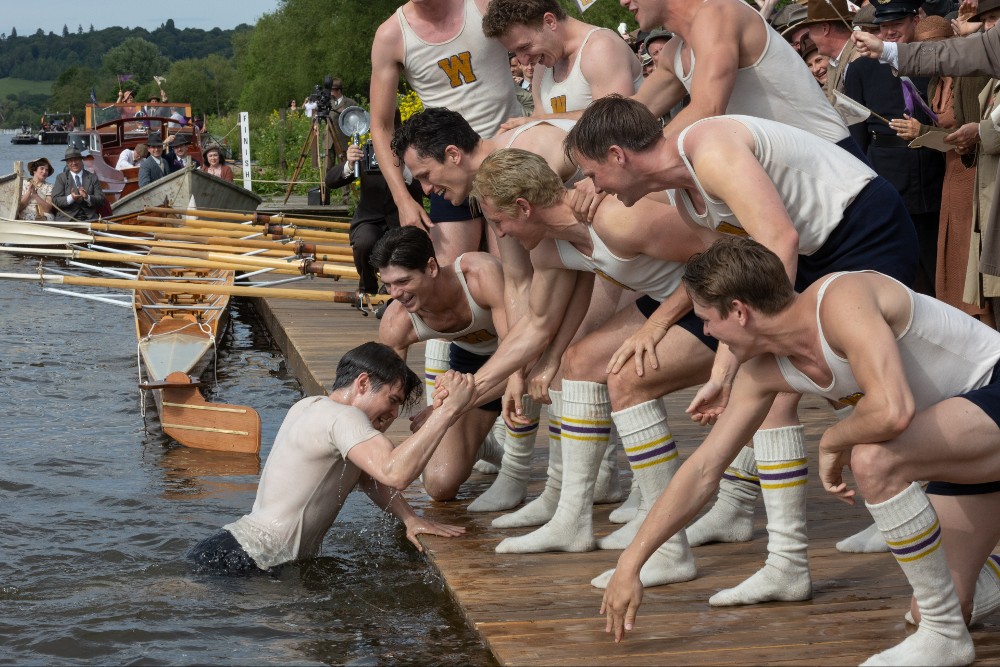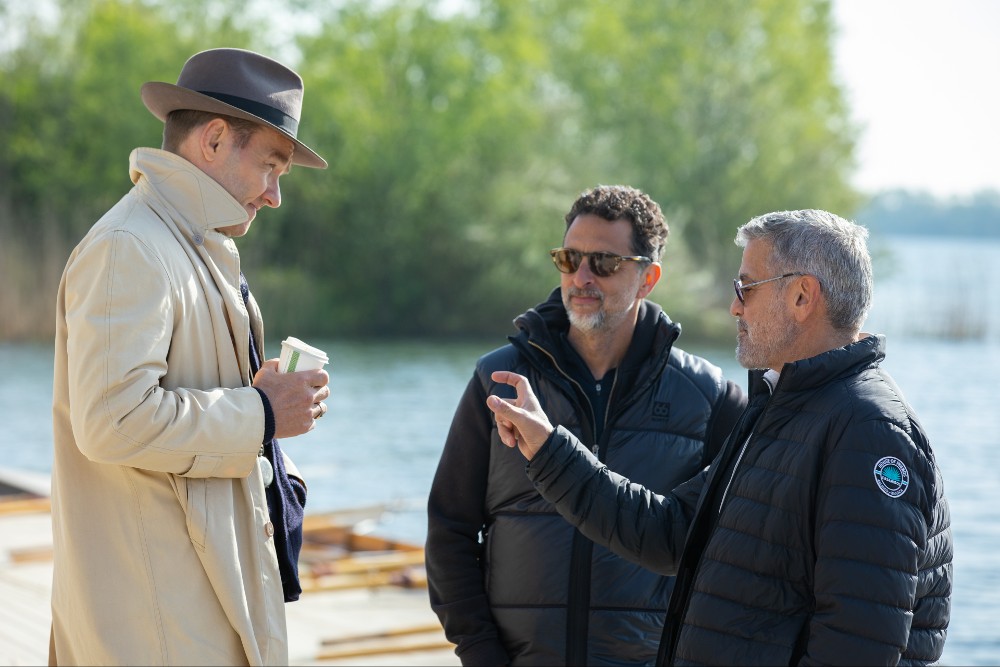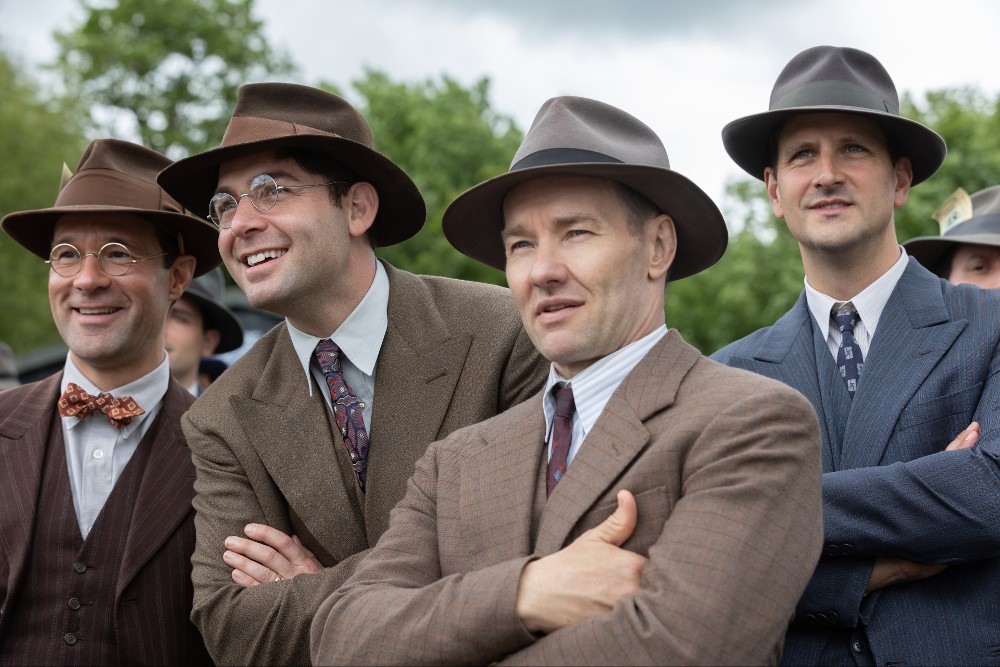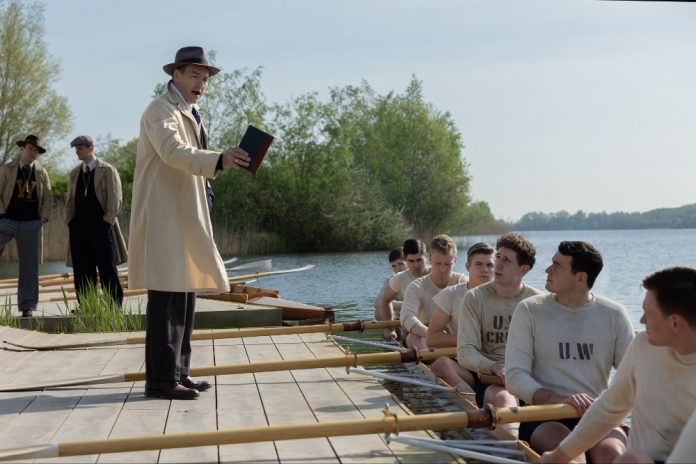Actor Joel Edgerton has been moving up the ranks as an actor since his big break came 20 years ago when he was cast as Uncle Owen in George Lucas’ Star Wars prequels. Since then, he’s been working with many illustrious filmmakers, such as Baz Lurhmann, Ron Howard, and others.
Edgerton is now starring in the George Clooney-directed The Boys in the Boat, based on the book by Daniel James Brown, about the University of Washington crew (i.e. rowing) team of the early ‘30s, who bested all odds to become America’s rowing team, travelling to Nazi Germany for the 1936 Summer Olympics. Edgerton plays Coach Al Ulbrickson, the tough head of the team, who keeps pushing them as hard as possible to be the best they can be. The story is just as much about Callum Turner’s Joe Rantz, a young man from a poor background whose success on crew means the difference of having a better life.
Above the Line spoke with Edgerton over Zoom a few weeks back, not just about the movie and being directed by Clooney – Edgerton is also an actor/director in his own right – but also about his own methods for directing and a desire to return to that.
Above the Line: This is a terrific film, and a story I’ve never heard about, so I wasn’t sure what to expect. What interested you in playing this coach?
Joel Edgerton: I’ve been through the sports movie thing before with Warrior, and I learned this big lesson with that. I was a UFC fan, but I knew there was a world of people that weren’t or that prejudge the sport or had an aversion to it. And yet, that film has such a following from people who aren’t UFC fans, but I think the lesson was that sports movies are really about the characters and about the subject of the underdog. That’s what really moves people. The sport could be anything, and I was thinking rowing as a cinematic experience, and I think George and [Producer] Grant [Heslov] have definitely made that so. The success of the movie is really about the underdog story, and this group of kids that aren’t really meant to be in this blue-blooded, elite sport, and prove everyone wrong. I think people will — excuse the pun — go along for the ride, because of that, whether they’re rowing fans or not, because it becomes a visceral experience.
For me — I hate to say it — I’m a little bit older now, so rather than having to go through the paces of all the training, I get to be the coach. And for me, the exciting challenge was talking to George about playing this coach that people described as very stoic and seemingly, not very happy, which is what I think most of the most successful coaches, and the ones that fascinate me, are the ones that look like they have zero fun doing the job. I think it’s because they care more than anyone else. They care about victory, they care about their sport and their team. I was really sort of down to do that. As much as I envied the boys going through the training process, because I knew what that feels like to go into a movie and get that opportunity, it was nice to just stand off to the side in a three-piece suit, and have a cup of tea. [laughs]

ATL: The movie has such a great youthful energy, so did you come into it feeling like an elder statesman, because I still feel you’re rather young despite having done this for a while.
Edgerton: Look, I became a dad during COVID, and it’s not that I consider myself an old guy and washed-up and cynical — I still feel very engaged and young. I did feel like a bit of an elder statesman, I think, and that was a weird pair of shoes to fill, because I remember when I was young guy jumping into movies, getting to work with people that were more experienced than me or had just been around for longer than me, it was always a real pleasure. I forget that I could be that to some other actors now. [chuckles] I really admired the relationship that the guys and I forged with each other. For whatever reason, they sort of looked up to me a little bit, and I wasn’t going to prove them wrong. I really enjoy working with younger actors and watching their spirit and their gumption and their ability to do things at an incredible level at such a young age.
ATL: Did this project just come to you as a script to go out for, or was George already attached to direct, and he came to you directly for this role?
Edgerton: Well, George had a conversation with me about it. He and Grant Heslov, and I had talked maybe five years ago about doing this other project that never came to be. I knew that there was an enthusiasm from all of us to work together, and then this came up, because George had said back then he really wanted to find something that we could do together. I felt flattered by that, but wondered if I’d ever hear from him ever again. When this came came round, I was like, “Oh, he actually meant it.” We just had a conversation about it, and then I read the script and the book. Like you said, it was a story that I didn’t really know about, but when you hear even the bare bones of that story, you can see why it’s a perfect true story to be turned into a movie – the stages of triumph for these young guys, and where they end up rolling at the Olympics in front of Hitler. It has all the hallmarks of a great sports movie.
ATL: The craziest thing for me was seeing the American teams arrive in Hamburg for the Olympics, since my own father lived in Hamburg at that time, he was a teenager, and it made me wonder if maybe he went to the pier to see the Americans arrive.
Edgerton: It’s really interesting to look at all that iconography and think about the period, because it was the growth of all of the things that we now know happened, but were not quite there yet. It was a weird scene to shoot, weird for all of us, actually, because [they] dressed up this place in London with all that stuff, the power of that iconography, obviously still holds a real gravity and weight. They are pretty extraordinary.

ATL: George is one of the actors who has done well through his directing. There’s Clint Eastwood, Ben Affleck, and George, and he has shifted more into directing now. As an actor who has directed yourself, were you interested in how he would be as a director?
Edgerton: I’m interested in those guys — George, Ben, and Bradley Cooper — who could easily, like any of us – I guess, myself included – the responsibility of being an actor lasts for the duration of your research and the shoot, and then you could sort of go off and do other things. The ability to make two or three movies a year as an actor, and make money and all that stuff, and yet, these guys take a year or more out of their life to develop a project where they’re behind the camera, sometimes both. And particularly with George, he’s doing that occasionally, where he’s not in front of the camera. He’s not in the limelight.
I talked about my character, as a coach, being someone that cares so much. He obviously cares enough to choose to do this, rather than shoot two or more movies in that same timespan. He cares enough about this to just tell this story from behind the camera and go through all of that prep, all of the shoot, all the post-production to get this story into the world. That to me was an early sign that this was going to be an interesting project, because he was willing to wear the headphones and the jeans and stand behind the camera, despite it not being a flashy thing for him. I think actors-turned-directors can do a marvelous job and have proven that time and time again.
ATL: I’m not sure if I told you about this when we spoke for The Gift, but when I spoke to Jason Bateman for his directorial debut, he told me that part of how he directs is by interacting with the actors as an actor. Since then, I’ve spoken to other actors turned directors, and it’s interesting to hear different reactions to that thought. You directed one movie in which you also acted and one in which you didn’t. Do you have a preference? Did you feel it was easier to get what you wanted when you were acting as well as directing?
Edgerton: I’ve directed twice where I was in both movies, but only for a small section of time, so I got the best of both worlds. I shot myself for like 10 days, and then I got to not have to wear makeup and costume… and just tell everyone else what to do. I find it’s very difficult when you’re in a scene with someone else. That the moment you call “cut,” it’s very hard to then straightaway tell another actor, “This is what you need to do differently,” because it feels it feels a bit unfair. It’s like, “Well, what about what I’ve done wrong or what I could do better?”
I find that sometimes the best thing to do then is to go to the monitor and go, “Okay, I know what I think I need to do differently” and then you could go and talk to the other actor, whereas the moment you call “Cut,” if you go “Cut, that was good, but…” That would feel a bit dishonest and a bit tricky. I had my brother [Nash] always on set with me if I’m directing and acting. I put my performance in his hands. I can look at him, and he usually is like, “Yeah, that was good. Do you want to try something else?” We have this shorthand that we have as brothers that spills into that work environment.
ATL: I have to imagine doing period pieces is fun, because you get to wear the makeup and costumes, but I was actually fascinated by these bleachers on the moving train alongside the boat race. Was that a real thing?
Edgerton: One of the things I love about this movie – and George said it to me early on before we made it – was he wanted to make an old school movie. I think that really shows in so many ways through the film and the romance element of the story and just the way characters are presented. It feels like we’ve made a throwback movie in some ways, but yeah, all the research is very authentic.
Rowing had a following for about 15 years that was bigger than any other sport in the United States, until I think, football came along. Hundreds of thousands of people would turn up to watch a big race, and they would literally stack a train, and the train track would be running alongside the river. I guess if you were wealthy enough, you could buy a ticket. You would either be on a boat on the river watching near the finishing line, or you could go along with the boats in the train. He can see old newsreel footage of that, which was pretty ingenious actually. We shot our train reactions to that Poughkeepsie race, stationary, in a car park. Magic of the movies. Actually, hats off to the… I’m really into visual effects when it’s there to augment a real story. I think there’s some really exquisite stuff in this when I think back to the locations and think we were just on a quarry in the Cotswolds in England. Apart from the trees, there was nothing else there – the river and the trees. And then you see the backdrop of the city and various other things you’re like, “Okay, this is pretty detailed, beautifully augmented stuff.”

ATL: Did you have a chance to do any writing yourself during COVID? Did you have some time to write something you might direct again down the road?
Edgerton: Yeah, absolutely. I definitely want to make another movie, and I have something I have written. All I would say is it’s sort of getting back to the tonal world of The Gift, which sort of really my interest in writing and watching movies is suspense, psychological drama. So yeah, I have something I want to make, and I’m hoping to move into doing that towards the end of next year, 2024, early 2025. I’ve been sort of very eager to do it and have written a lot, and I’ve been waiting, because I became a dad. My kids are two and a half, I have twins, and I thought once they’re ready to go to school, maybe then I’ll be ready to bite that task off. So that’s coming up soon.
ATL: I really enjoyed Thirteen Lives and Master Gardener last year, and I’m not sure you heard that John Waters just put Master Gardener on his top 10 list for this year.
Edgerton: Somebody sent it to me the other day. I was very, very thrilled by that actually.
ATL: It was an amazing and quite eclectic list, as you might imagine coming from John Waters.
Edgerton: Yeah, that was pretty cool. A friend of mine sent that to me, literally yesterday; I was like, “Cool.” Isn’t that the beautiful thing about movies is they’re like outfits. Everybody has their own favorites, and movies are there to be mined of really personal stuff as well, particularly in the hands of a filmmaker like Paul Schrader. There’s enough blank canvas for people to reach in and pull their own meaning out of things. If we all love just the exact same movies… I know some things rise to the top and are very popular, but even people I think I know their mind, and they love a movie that I might not like and vice versa. It’s part of the pleasure of it all.
The Boys in the Boat opens nationwide on Christmas Day, December 25, that’s a Monday.



